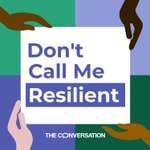Don’t Call Me Resilient – Details, episodes & analysis
Podcast details
Technical and general information from the podcast's RSS feed.

Don’t Call Me Resilient
The Conversation, Vinita Srivastava, Dannielle Piper, Krish Dineshkumar, Jennifer Moroz, Rehmatullah Sheikh, Kikachi Memeh, Ateqah Khaki, Scott White
Frequency: 1 episode/18d. Total Eps: 88

Recent rankings
Latest chart positions across Apple Podcasts and Spotify rankings.
Apple Podcasts
🇨🇦 Canada - newsCommentary
08/06/2025#90🇨🇦 Canada - newsCommentary
16/05/2025#94🇨🇦 Canada - newsCommentary
14/05/2025#84🇨🇦 Canada - newsCommentary
10/05/2025#77🇨🇦 Canada - newsCommentary
09/05/2025#72🇨🇦 Canada - newsCommentary
02/05/2025#87🇨🇦 Canada - newsCommentary
30/04/2025#64🇨🇦 Canada - newsCommentary
27/04/2025#91🇨🇦 Canada - newsCommentary
26/04/2025#94🇩🇪 Germany - newsCommentary
05/04/2025#89
Spotify
No recent rankings available
Shared links between episodes and podcasts
Links found in episode descriptions and other podcasts that share them.
See allRSS feed quality and score
Technical evaluation of the podcast's RSS feed quality and structure.
See allScore global : 73%
Publication history
Monthly episode publishing history over the past years.
FLASHBACK: The dangers of hair relaxers
Season 7 · Episode 19
jeudi 29 août 2024 • Duration 29:55
In this reflective and personal episode of Don’t Call Me Resilient, Prof. Cheryl Thompson of Toronto Metropolitan University and author of Beauty in a Box untangles the wending history of hair relaxers for Black women — and the health risks now linked to them.
For decades, Black women have been using hair relaxers to help them “fit into” global mainstream workplaces and the European standards of beauty that continue to dominate them. More recently, research has linked these relaxers to cancer and reproductive health issues — and a spate of lawsuits across the United States, and at least one in Canada, have been brought by Black women against the makers of these relaxants.
Prof. Thompson and I get into it: including her own relationship to using relaxers as a Black woman, the lawsuits and the wending history and relationship between these relaxants and Black women. We also — for obvious reasons — dip into The Other Black Girl, the novel that is also now a horror-satire streaming series about mind-controlling hair products.
For more information and resource, go here: SHOW NOTES
A full transcript of the episode can be found here: TRANSCRIPT
FLASHBACK: Why isn't anyone talking about who gets long COVID?
Season 7 · Episode 18
jeudi 15 août 2024 • Duration 26:38
If you don’t pay close attention to news about COVID, you might think the pandemic is nearly over. But for the millions of people worldwide suffering from long COVID, that couldn’t be further from the truth.
And the number of those experiencing long-term symptoms keeps growing: At least one in five of us infected with the virus go on to develop long COVID.
The effects of long COVID are staggering. Researchers say it can lead to: blood clots, heart disease, damage to the blood vessels, neurological issues, cognitive impairment, nerve damage, chronic pain and extreme fatigue.
And there is no treatment for long COVID.
So why don’t we hear more about long COVID? Why haven’t governments warned people about the risks we face with infection?
It might be that this debilitating disease is largely overlooked because of who gets it: Almost 80 per cent of longhaulers are women.
And in the United States, where our guest on this episode is from, many of those suffering from the prevailing conditions of COVID are women of colour, with Black and Latinx people most likely to get the illness.
Our insightful guest for this conversation on long COVID is Margot Gage Witvliet, assistant professor at Lamar University in Beaumont, Texas. Margot is a social epidemiologist who studies health disparities, including as they relate to long COVID and has presented her research findings to the United States Health Equity Task Force on COVID-19.
Margot is also a Black woman living with long COVID and has created a support and advocacy group for women of colour.
For more information and resources, go here: SHOW NOTES
A full transcript of this episode can be found here: TRANSCRIPT
In India, film and social media play recurring roles in politics
Season 7 · Episode 11
jeudi 23 mai 2024 • Duration 34:04
Currently the largest electorate in history is heading to the polls in India, where - of course - politicians and political parties are trying their best to influence voters. Film and popular culture have always provided a reflection of the country's political culture, but in this election, they are being used more than ever to *sway* voters - especially by Prime Minister Narendra Modi and his right-wing, Hindu nationalist Bharatiya Janata Party, the BJP. Vinita sits down with two scholars who look at the intersection of politics and popular culture to uncover how Bollywood is creating storylines that support Modi's BJP - and how big a role it might play in the outcome of the world's largest election. Political scientist Sikata Banerjee is Professor Emeritus of Women’s Studies at the University of Victoria She looks at Indian politics through the lens of cinema. And Rakesh Sengupta is Assistant Professor in Department of English and Cinema Studies at the University of Toronto.
A different way to address student encampments
Season 7 · Episode 10
jeudi 16 mai 2024 • Duration 30:50
Collectively, the global student protests demanding university divestments from Israel are one of the largest mass protests in recent history. Student protesters are risking their futures as they demand their institutions financially divest from Israel and companies connected to supplying weapons and technology to Israel’s government.
Last week, in Calgary, police descended on the University of Calgary campus with riot gear, using shields, batons and rubber bullets, to forcibly remove a group of protesters from an encampment set up on campus.
On today's podcast, Vinita speaks with Pratim Sengupta, professor of learning sciences at the University of Calgary. Sengupta was there the night police engulfed the protesters and says the violence he saw shook him to his core. Also on the podcast is Sarita Srivastava, a university leader of a much smaller arts and design campus in downtown Toronto. Srivastava (sister to Vinita) is a sociologist by background and author of the recent book, "Are You Calling Me a Racist?" Together, they look back on what's been happening on campuses amid this mass protest but also plot out a new - gentler - way forward than the one we've been witnessing.
Digging into the colonial roots of gardening
Season 7 · Episode 9
jeudi 9 mai 2024 • Duration 32:16
As we approach the start of gardening season, we figured it’s a good time to bring you one of our most talked-about episodes about the complicated, colonial roots of gardening - which have affected what we plant and who gets to garden.
How we garden is deeply tied to colonialism — from the spread of seeds and species around the world to the use of forced labour and slavery that went hand in hand to the collection and commodification of plants. But there is a growing shift away from the status symbol of the lawn and manicured gardens, in favour of pollinator-friendly native plants. And there is a growing understanding that centuries-old Indigenous knowledge and practices — like controlled burns — can help foster a more resilient landscape. With concerns about our climate crisis growing, one of the possible avenues for creating more sustainable cities may very well lie in our gardens.
Could we have an impact simply by thinking a little differently about the seeds we sow and the "weeds" we pull?
Vinita gets into it all with researcher Jacqueline L. Scott and community activist Carolynne Crawley, who leads nature workshops that integrate Indigenous teachings into practice.
Why students harmed by addictive social media need more than cellphone bans and surveillance
Season 7 · Episode 8
jeudi 2 mai 2024 • Duration 36:55
Research shows social media apps are designed to entrap children who are even more susceptible than adults to its harms. Plus, technologies are not neutral: They’re embedded with and actively reinforce structures of racism. A recent survey of Canadian children in grades 7 to 11 found nearly half of participants reported seeing racist or sexist content online, and youth from marginalized groups were more likely than others to encounter this type of content. So, what’s to be done?
Five school boards in Ontario have recently sued the makers of Facebook, Instagram, TikTok and Snapchat for $4.5 billion, arguing the social media giants are causing mental health issues and other harms that are making the jobs of educators much harder. The Ontario Premiere has called the lawsuit a waste of time and money, and announced its government was doubling down on a 2019 ban on cellphones in schools as a way to address the problem. It also pledged $30 million to a surveillance program they think will help solve problems in school like cell phone and vape addictions.
On today's episode, Vinita gets into it with two education researchers, both former teachers, who challenge the idea of a ban and think there are better ways to address the problem.
From stereotypes to sovereignty: How Indigenous media makers assert narrative control
Season 7 · Episode 7
jeudi 25 avril 2024 • Duration 41:44
Over the last 30 years, there has been an exponential growth of Indigenous media and Indigenous media makers, especially here in Canada which has one of the largest repositories of Indigenous media. However, the road to get here hasn’t been easy. Indigenous filmmakers, producers, and artists have had to navigate the complex and often unfriendly terrain of Canadian media institutions and media production companies. Their negotiations -- and struggles -- have helped make space for a generation of Indigenous media-makers who are increasingly making shows and films on their terms, with their ideas.
Karrmen Crey who is Stó:lō from Cheam First Nation, is an associate professor in the School of Communication at Simon Fraser University in Burnaby, British Columbia, and the author of “Producing Sovereignty: The Rise of Indigenous Media in Canada.” In this special episode, recorded on-site with an audience in Vancouver at Iron Dog books, Karrmen speaks with Vinita about the ways Indigenous creators are using humour along with a sharp critique of pop culture to show just how different the world looks when decision-making power over how stories get told shifts and Indigenous media makers take control.
This episode was produced in front of a live audience at Iron Dog Books in Vancouver, in partnership with Simon Fraser University's Faculty of Communication, Art and Technology and the Amplify Podcast Network. Simon Fraser student, Natalie Dusek performed tech duties. Theme music by Zaki Ibrahim, Something in the Water.
Image credit: Jana Schmieding plays Reagan, a member of the fictional Minishonka nation, on the sitcom, Rutherford Falls. (Evans Vestal Ward/Peacock)
The chilling effects of trying to report on the Israel-Gaza war
Season 7 · Episode 6
jeudi 18 avril 2024 • Duration 39:51
Many news organizations have reported on the Israel-Gaza war. However, many journalists have criticized those same media organizations for how they have covered the conflict, and have spoken out against what they say is a stifling of Palestinian voices and perspectives. In today's episode, Vinita talks to Sonya Fatah and Asmaa Malik, associate professors of journalism at Toronto Metropolitan University whose research focuses on newsroom culture, global reporting practices and equity in journalism. They argue that these press freedom concerns go far beyond Gaza.
Asylum seekers from Gaza and Sudan face prejudiced policies and bureaucratic hurdles
Season 7 · Episode 5
jeudi 11 avril 2024 • Duration 38:32
Around the world, people are being forced to leave their homes in droves. We are seeing it happen in Gaza, as Israeli forces continue to wage war. And in Sudan, which has also been wracked by war. Then there are the people fleeing political or economic strife - like those living in Haiti, or Venezuela. Canada has various refugee programs designed to take in those seeking asylum from what's happening in their home countries. But the problem is, they weren't all created equal. In today's episode, Vinita talks to Christina Clark-Kazak, professor of public and international affairs at the University of Ottawa. Clark-Kazak says Canada's refugee system has always been politicized - but never more so than now.
Beyoncé’s ‘Cowboy Carter’ transmits joy, honours legends and challenges a segregated industry
Season 7 · Episode 4
jeudi 4 avril 2024 • Duration 40:44
The release of Beyoncé’s new album, Cowboy Carter, was a much awaited event for a lot of us. There was much anticipation about this being a country album — and a lot of talk about the resistance some radio stations had and still have to that idea. That’s because country music is considered "white music," even though its Black historical roots are well documented. But Cowboy Carter is about so much more than country music. It honours other Black musical legends — and challenges the segregation we still see and hear in the music industry today. Vinita is joined by two experts to talk about it all. Alexis McGee is an Assistant Professor of Writing Studies at the University of British Columbia and author of "From Blues to Beyoncé: A Century of Black Women’s Generational Sonic Rhetorics." And Jada Watson is Assistant Professor of Digital Humanities at the School of Information Studies at the University of Ottawa. Her current research, called SongData, uses music industry data to examine representation in the country music industry.









